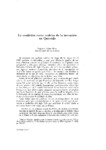La erudición como nodriza de la invención en Quevedo

Use this link to cite
http://hdl.handle.net/2183/11711Collections
- Investigación (FFIL) [877]
Metadata
Show full item recordTitle
La erudición como nodriza de la invención en QuevedoAuthor(s)
Date
1999Citation
López Poza, Sagrario, "La erudición como nodriza de la invención en Quevedo", La Perinola 3, 1999, págs. 171-194.
Abstract
Se analizan los criterios que existían sobre el concepto de “erudición” en el siglo XVII, tomando como base fundamentalmente las recomendaciones del jesuita Nicolas Caussino en su obra Eloquentiae sacrae et humanae parallela (1619). Se explica cómo se hacía uso de las fuentes de erudición, sobre todo como auxiliares de la inventio, en la variedad de prosa discursiva de carácter ensayístico o con finalidad didáctica practicada por los hombres cultos cada vez más a partir de la segunda mitad del siglo XVI. Tomando esas referencias, se analiza luego la obra de Quevedo "Providencia de Dios" y se constata que emplea prácticamente todos los recursos recomendados por Casussino para producir una prosa nutrida de erudición. The main criteria involved in the concept of “erudition” in the XVIIth Century are examined, taking into account essentially the jesuit Nicolas Caussino's suggestions in his work Eloquentiae sacrae et humanae parallela (1619). Nicolas Caussino explains how the sources of erudition should be used, especially as a support of the inventio, in the variety of a discursive prose used as an essay or with a didactic propouse, employed by scholars from the second half of the XVIth Century each time more. Taking these references, Quevedo's Providencia de Dios is analysed to prove that almost all the statements recommended by Caussino are employed to produce a prose full of erudition.
Keywords
Quevedo, Francisco de
Erudición
Literatura-Temas y motivos
Erudición
Literatura-Temas y motivos
ISSN
1138-6363





